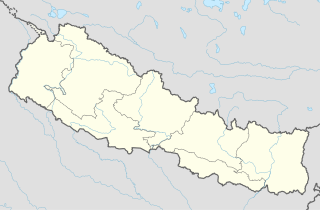
The administrative divisions of Nepal are subnational administrative units of Nepal. The first level of country subdivision of Nepal are the provinces. Each province is further subdivided into districts, each district into municipalities and rural municipalities, and each of those municipalities into wards. Before 2015, instead of provinces, Nepal was divided into developmental regions and administrative zones.

Solududhkunda (earlier:Dudhkunda) is the only municipality of Solukhumbu District. Located in Province No. 1 of Nepal. The town of Salleri, which is located within the municipality is the headquarter of Solukhumbu District It was formed in 2014 by merging four VDCs: Salleri, Garma, Loding Tamakhani and Beni and was divided into 9 wards. Total area of the municipality had 254.3 square kilometres (98.2 sq mi) and population of municipality had 20,399 individuals living in 5,368 households.

A Village Development Committee (VDC) in Nepal was the lower administrative part of its Ministry of Federal Affairs and Local Development. Each district had several VDCs, similar to municipalities but with greater public-government interaction and administration. There were 3,157 village development committees in Nepal. Each VDC was further divided into several wards depending on the population of the district, the average being nine wards.

Jogimara was a village development committee in Dhading District in the Bagmati Zone of central Nepal. At the time of the 1991 Nepal census it had a population of 5080 and had 927 houses in it. On March 10, 2017, the Government of Nepal restructured local level bodies into 753 new local level structures. Mahadevsthan, Benighat, Dhusha and Jogimara VDCs were merged to form Benighat Rorang. हुग्दिखोला Majhimtar Jamireghat is the main market of Jogimara VDC. Here lies a calcium ore.

Maidi is a village in Dhading District in the Bagmati Zone of central Nepal. At the time of the 1991 Nepal census it had a population of 8496 and had 1627 houses in it.
Ballia is a village in Kailali District in the Seti Zone of western Nepal. At the time of the 1991 Nepal census it had a population of 17512 living in 3294 individual households.

Melung is a Rural municipality located within the Dolakha District of the Bagmati Province of Nepal. The municipality spans 86.54 square kilometres (33.41 sq mi) of area, with a total population of 20,210 according to a 2011 Nepal census.

Sukhipur is a municipality in Siraha District in the Sagarmatha Zone of south-eastern Nepal. After the government announcement the municipality was established on 19 September 2015 by merging the existing Mohanpur Kamalpur, Vidhyanagar, Kushaha Laksiminiya, Kabilasi, Silorba Pachhawari Balhi and Sukhipur village development committees (VDCs). The center of the municipality is establish in Sukhipur Bazaar. At the time of the 2011 Nepal census after merging the seven VDCs population it had a total population of 20,915 persons. After the government decision the number of municipalities has reached 217 in Nepal.

Byans is a rural area of Byans Rural Municipality, previously it was a Village development committee (VDC) of Darchula District in Sudurpashchim Pradesh of western Nepal. At the time of the 1991 Nepal census it had a population of 723 people living in 150 individual households.

Tapoban is a village in Darchula District in the Mahakali Zone of western Nepal. At the time of the 1991 Nepal census it had a population of 1841 people living in 305 individual households.

Katahariya is a municipality in Rautahat District in the Narayani Zone of south-eastern Nepal. Before September 2017, Katahariya was one of the Village Development Committees with 8 wards. At the time of the 1991 Nepal census, it had a population of 4,619 people living in 835 individual households. Katahariya is famous for its vegetables and cattle market. It has a well-maintained Farmers' market (vegetable) and Cattle (domestic-animal) market. Katahariya is a fast-growing VDC, with the main occupations of local people being business and farming.

Gonaha is a village in Rupandehi District in Lumbini Province of southern Nepal. At the time of the 1991 Nepal census it had a population of 10,838.

Bhedihari is a village in the Parsa District of the Narayani Zone, southern Nepal. At the time of the 2011 Nepal census it had a population of 5,772 people living in 846 individual households. There were 2,977 males and 2,795 females at the time of census.

Markhu is a village in Makwanpur District in the Narayani Zone of southern Nepal. At the time of the 1991 Nepal census it had a population of 3137 people living in 581 individual households.

Titirkhi is a village in Kapilvastu District, in the Lumbini Province of southern Nepal. At the time of the 1991 Nepal census it had a population of 3241 people living in 491 individual households.

Udayapur is a village in Kapilvastu District of the Lumbini Province of southern Nepal. At the time of the 1991 Nepal census it had a population of 2814 people living in 478 individual households.
Hardauna is a village in the sub-metropolitan municipality of Maharajganj in the Kapilvastu District of the Lumbini Province. The village is in a terai region in southern Nepal. It is on the Banganga, a river which arises on the southern slopes of the Sivalik Hills and flows across the terai, reaching into Uttar Pradesh state in India.

Kajarhawa is a village in Kapilvastu District in the Lumbini Province of southern Nepal. At the time of the 2001 Nepal census it had a population of 3438 people living in 571 individual households.

Gaunpalika is an administrative division in Nepal. The Ministry of Federal Affairs and Local Development (Nepal) dissolved the existing village development committees and announced the establishment of this new local body. It is a sub-unit of a district. There are currently 460 rural municipalities.







